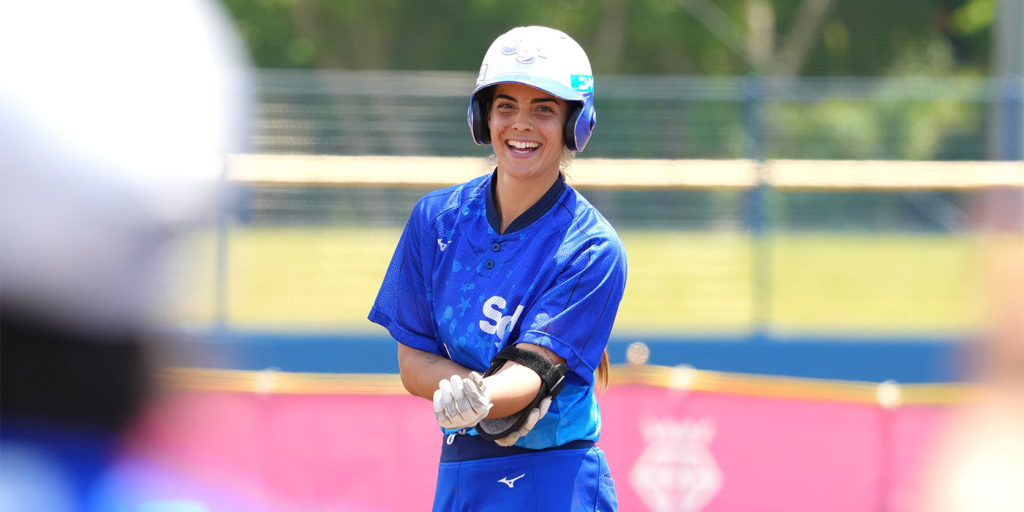
This year was a full one for softball star Erika Piancastelli, and 2023 is likely to be even busier.
After playing professionally in her native Italy and the United States in 2021, the slugging, globe-traveling catcher and outfielder added a couple of new experiences in 2022, taking a leading role in the debut of Major League Baseball’s Home Run Derby X in London and Seoul and participating in Japan’s professional softball league. Plus, she still managed to sandwich in another season with Athletes Unlimited in the U.S.
And, next year, she’ll find some way to shoehorn into her calendar qualifying for the world championship tournament with Team Italy.
“Life is kind of busy right now,” Piancastelli said with a laugh.
Indeed.
Let’s start with her first exposure to Japan, home of the last two Olympic softball gold-medal teams and perhaps the world’s highest level of softball competition.
Early this year, Piancacastelli signed with the Kyoto-based SGH Galaxy Stars of the Japan Diamond League. She went in knowing it would be a different environment and that adjustments would be necessary. The Japanese style of play is different, the approach toward practice is worlds away from what westerners are used to, and the strike zone is bigger for foreigners. And that’s just for starters.
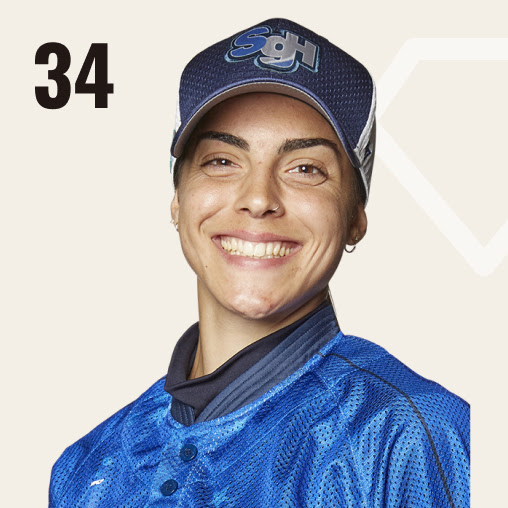
“I was more excited than nervous at first,” she said. “I knew that it was a very high-level league, and things like the speed of the game, the strategies, how they call pitches, and the strike zone aren’t what I was used to. I didn’t start to feel comfortable until the second half.
“There was no specific ‘aha’ moment, but toward the end of the season I started being a more patient hitter. For a while, I was trying to force things to happen and swinging at pitches I shouldn’t have. But after a while, I knew more about what to expect. I started having more of a purpose each time I went to the plate. I was learning something every day in the first half; in the second half, I could concentrate more on my performance.”
Foreign softball and baseball players in Japan have long recognized that the strike zone there is bigger for foreign hitters and smaller for foreign pitchers.
“It throws you off mentally more than anything,” Piancastelli said. “I’ve always done a lot of eye training for the strike zone, so it gets frustrating when it seems like anything can be called a strike. Your approach has to change. You can’t let one bad call get you out of the at bat. You have to find a way to hit that pitch.
“And the Japanese pitchers approach things differently, too. They’re very precise with location and also know how to spin the ball so it comes at an angle. They don’t usually overpower you, but they mix pitches very well and their pitch sequence is sometimes different, which I’m still learning.”
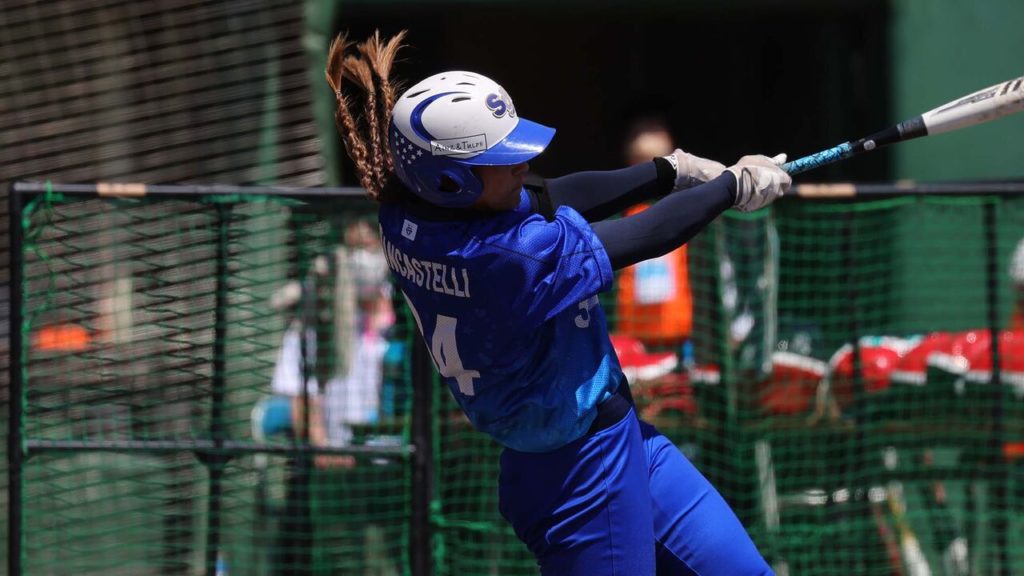
Getting used to the Japanese practice regimen took some learning, also.
“The practices are very repetitive, for sure,” she said. “They view softball as a job. They practice from 9AM to 3PM. If our coach thinks we might go into extra innings in the next game, we might work for an hour in practice on, say, 9th– or 10th-inning situations. But it doesn’t seem to affect the Japanese players; they’re always smiling, while it can be exhausting to us. Having said that, they’re flexible with us – they have to be if they want foreigners to play in the league.”
Despite the challenging adjustment period, Piancastelli batted .289 for the season with seven home runs and 11 extra-base hits. The batting average and home run total were second on the Galaxy Stars, and her contributions helped the team make the playoffs for the first time since the club was founded in 2005. The performance earned her a contract for next season.
“Overall, I learned a lot and am pretty happy with how I did – and the team getting into the playoffs was great – but I know I can do a lot better.”
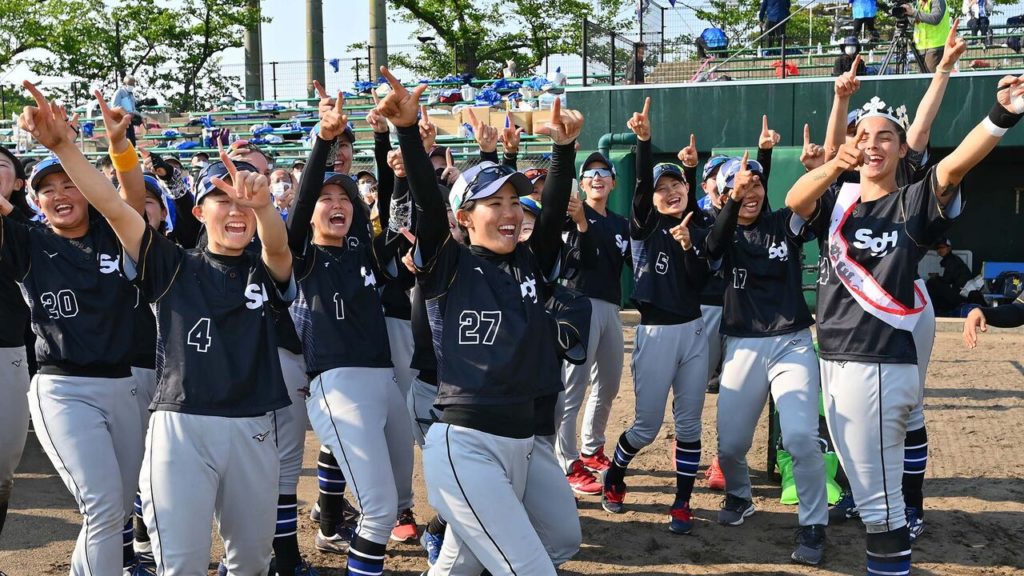
The Japanese season is split, with the first half ending in mid-June and the second not beginning until September, so Piancastelli was able to fit Athletes Unlimited and Home Run Derby X into her schedule.
Athletes Unlimited is an innovative network of professional women’s sports based in Chicago. There are four softball teams that play in a six-week season that sees the players changing teams on a weekly basis. An alternative scoring system enables players to earn points. The top four point-getters at the end of each week become captains and draft players to form teams for the coming week. Players earn points from individual innings won, overall team wins, and individual stats. Their points determine their rankings, which are used each week for the draft.
“It’s really fun and challenging,” Piancastelli said. “The format is unique, and the level of competition is high. They reached out to me in 2020 to see if I was interested, and I did well enough that I was invited back for 2021 and have a contract through next season.”
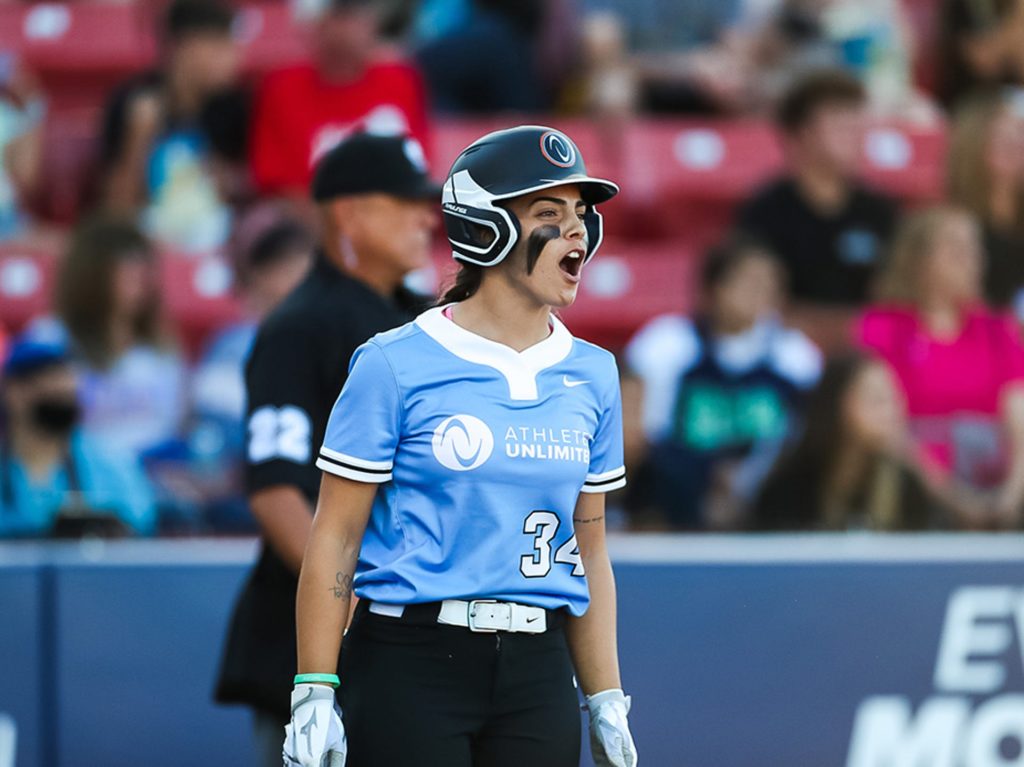
In her first two seasons in Athletes Unlimited, she batted .295 with 12 home runs and 25 RBI in 30 games, while slugging .884 in 2020 and posting a .418 on-base percentage in 2021. In 2022, she batted .327 with nine home runs and 15 RBI in 52 at bats. Her point total placed her 15th out of the 60 players.
Piancastelli also shone brightly in the HRDX event, which Major League Baseball initiated in 2022 as a way of attracting broader interest in the game. Events were held in London, Seoul, and Mexico City. It’s a home run derby with some twists to make it as entertaining as possible. Each of the four teams was comprised of a “legend” (a former MLB player), a “superstar” (a female athlete; Piancastelli filled this role in London and Seoul), a “wild card” (an athlete from a different sport), and a “rookie” (someone who had played baseball in the city in which the event was held). Batters earned points for hitting home runs, of course, and also for hitting exploding targets, while outfielders would get points for catching balls in certain zones.
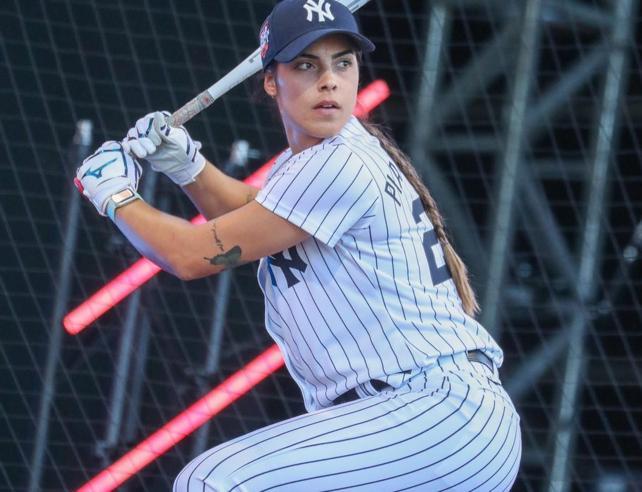
Piancastelli, playing for the Yankees, was voted MVP of the inaugural event, in London, after finishing with 15 home runs – including 12 in the Yankees’ 42-41 victory over the Red Sox in the final – and tying for the most points (25) among participants who were not former major league players.
And she made a huge play in the field, as well. With the Yankees leading by just two points, Piancastelli made a diving catch that gave her team two points that were crucial in an eventual one-point win.
“It took a while to get used to balls that were thrown overhand,” she said, “but it wasn’t totally new since I had done a lot of baseball training in the off-season while I was in college. What was really different was being on an elevated stage – like a normal concert stage.”
Not that being onstage, athletically, was anything new for her, though that wasn’t pre-ordained. Her winding road to this point has covered many miles, but she’s never carried a map with detailed instructions.
“When I was younger, I never thought that far ahead – about the future,” Piancastelli acknowledged, “and I never thought softball would take me this far. Softball wasn’t in the Olympics when I was younger, so it was a good while before I realized what I could do with the sport and where it could take me.”
Her journey began in Modena, Italy, where she was born in 1996. When she was five, the family moved to Carlsbad in Southern California when her computer-programmer father had an employment opportunity.
“He had a very good position in Italy, but he put his name on a job website and, to his surprise, got an offer from a company in California. They thought they’d be there for a couple of years or so.”
Instead, it was two decades before her parents returned to Modena. In the interim, Piancastelli and her twin sister, Nicole, grew up playing various sports. Though her father, Pier Andrea Piancastelli, had played professional baseball in the Italian Baseball League and her mother, Loredana Auletta, was a member of the 2000 Italian Olympic softball team that won two games in Sydney, their parents wanted the girls to try all sports and didn’t push either to play on the diamond.
“If they had forced it on us, we might not have played as much,” Piancastelli said.
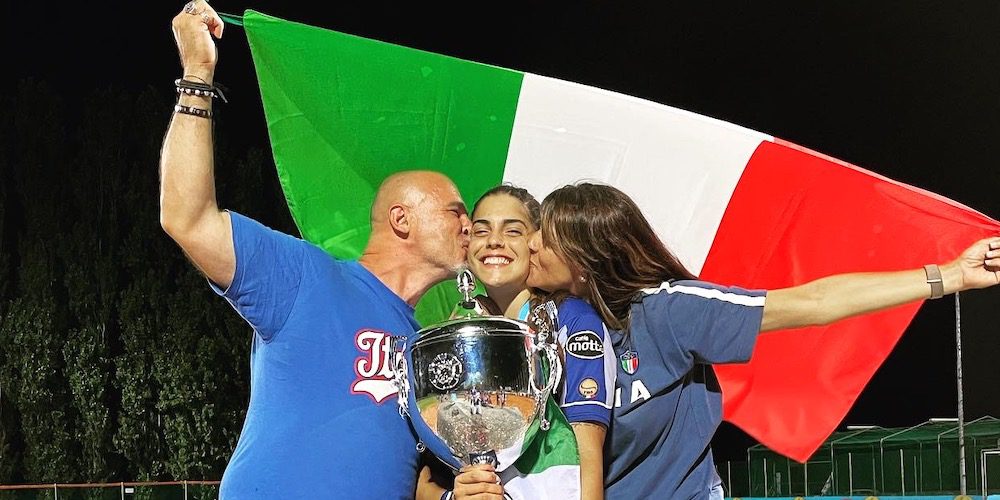
Nicole eventually chose basketball and played through junior college, while Erika stayed with softball as a catcher and sometimes first baseman and outfielder. Though Erika was captain of her Carlsbad High School team and twice led the team in home runs, she didn’t then have an all-encompassing drive to take her career as far as possible. She eventually found her way to McNeese State University in Louisiana – a world away from Southern California – but even that kind of, sort of, just happened.
A coach saw her at a clinic for pitchers and catchers the day prior to a travel team tournament and later contacted her. She eventually committed to McNeese State before her junior year even started.
“I hadn’t really thought about college at that point,” Piancastelli said. “I was never that person who was looking to go to college and play, so I was never striving for it. But it was my only scholarship offer, and three other teammates were going to McNeese. Plus, it was a full ride, so I went ahead with it, even though it was a long way from home and in a very different environment.”
And that’s when she began to realize that softball might be a vehicle she could ride a long way.
In her first game with McNeese State in February 2015, Piancastelli was 2-4 at the plate with a double and an RBI, and she never slowed down. By the season’s end, she was the team leader in hits, batting average (.430), RBIs (54 in 55 games), home runs (a then-school record 18 that she later exceeded), doubles, and slugging percentage (.905). She earned Freshman-of-the-Year, Player-of-the-Year, and Hitter-of-the-Year honors in her conference, as well as third-team all-America recognition.
“There was definitely an ‘Aha!’ moment there, or at least the beginning of one,” she said. “I’d always loved playing, but I then started to think about reaching the highest level I could. Like the Olympics – I never thought about that until I got to college. It was just that overall freshman experience that got me going – playing 50 games, working out all the time, and just seeing what it takes to play a full season.”
Clearly, she had what it took, as she continued her first-year success throughout a legendary career that finished with the 2018 season. Piancastelli was voted the Southland Conference Player-of-the-Year and Hitter-of-the-Year in each of her four collegiate seasons, and she remains the conference record-holder in RBIs, home runs, doubles, slugging percentage, and bases on balls.
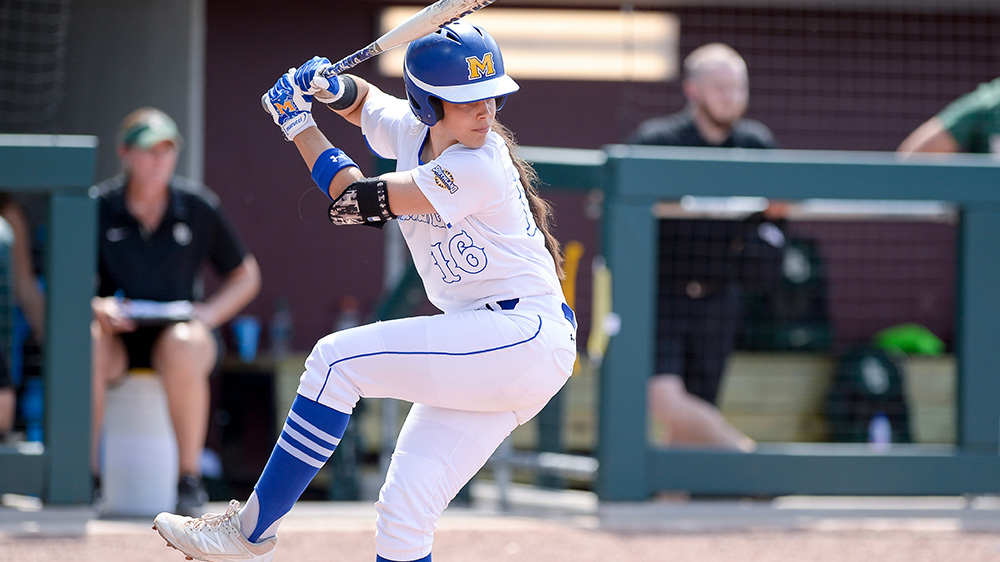
She batted .401 over the four seasons with a .560 on-base mark and .868 slugging percentage (56% of her hits were for extra bases). She drove in 212 runs in 235 games and had a 79% success rate at base-stealing. She had a slugging percentage of 1.000 in her sophomore year. During her time there, McNeese won consecutive conference tournament championships and reached the NCAA playoffs for the first time.
In addition, she would go back to Italy each year and play for the national team before returning to McNeese.
“I think she is [the greatest athlete in McNeese State history],” her college coach, James Landreneau, said after her final season. “It’s pretty impressive. It’s very unique. It’s hard to argue about her talent.”
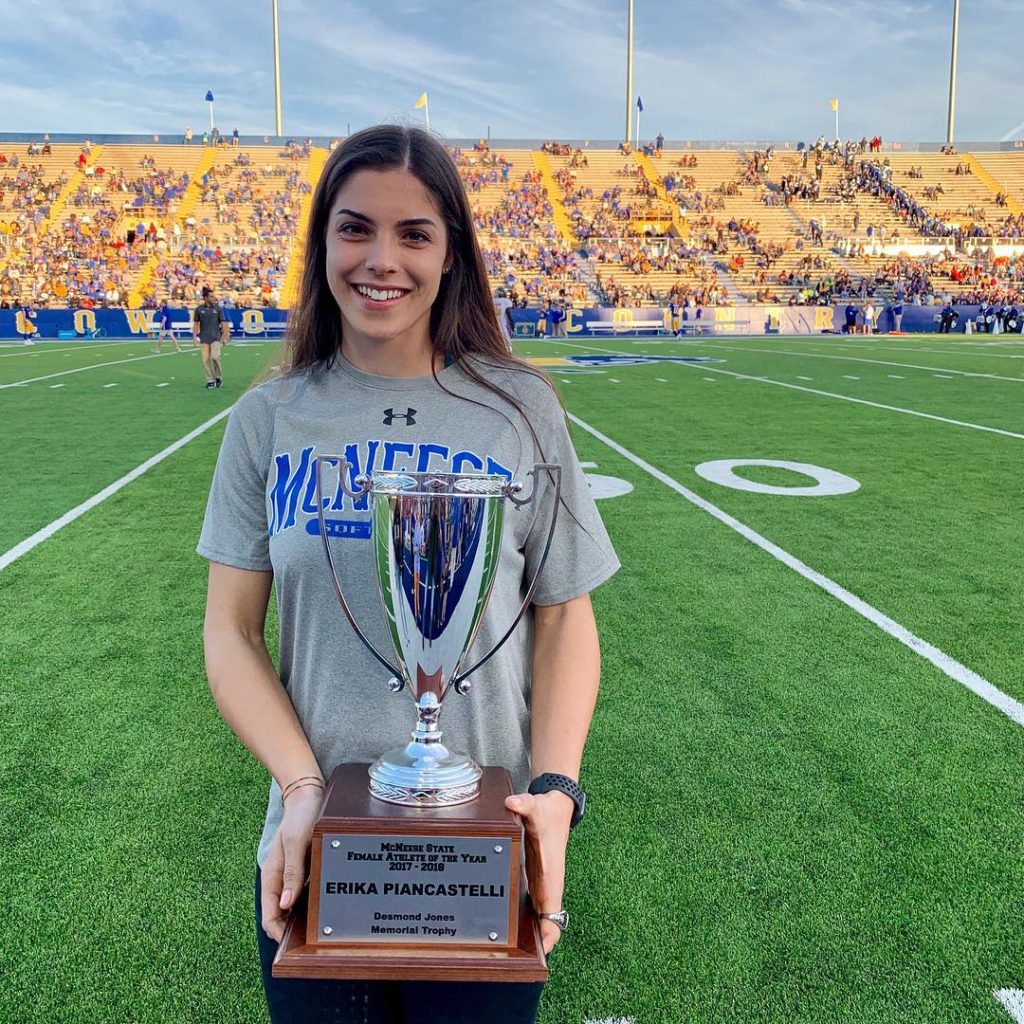
Greta Cecchetti is an Italian who played college ball in the United States at Texas A&M – Corpus Christi, which is in the same conference as McNeese State, but she had finished her career by the time Piancastelli began hers. Since then, though, Cecchetti has played against her in the Italian league and with her in Japan with the Galaxy Stars.
“She was known for her offense, but she has a cannon for an arm and is really hard to steal against,” Cecchetti said. “She sometimes is a designated hitter, but not too often because she’s someone you want on the field.”
“People have always had great things to say about Erika. When I first played on the same team with her, she was very quiet – just sitting back and listening – but she gradually became more of a leader and found her voice. She’s a person people look up to.”
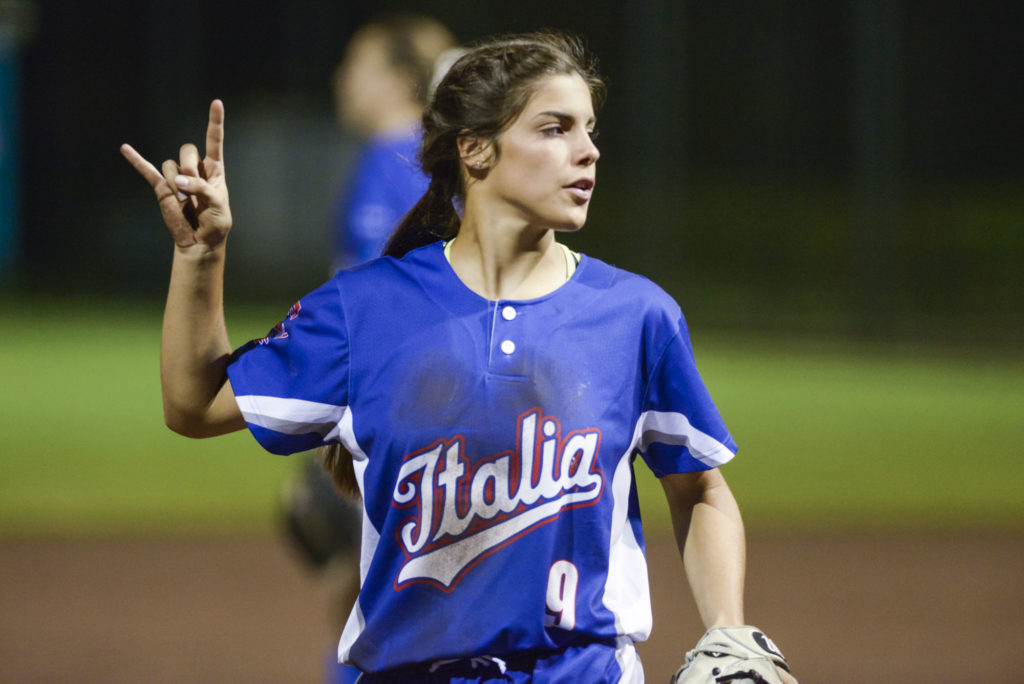
Rosellini Francesca, known to most as simply “Juni,” coached Piancastelli in Italy, but he’s been aware of her for much longer. A native of Aruba who has lived in the Netherlands for 30 years and once coached the Dutch national softball team, Francesca first saw her play in 2015.
“At the time, she had just finished her first year in college, but she was burning up our league, and they added her to the Italian national team,” Francesca recalled. “Even then, everyone could see that she could play. By the time of the European championships that year, she moved up to the first team. I saw a kid who, at 17, could hit the ball 120 meters (393 feet) and also had a great throwing arm. She was a pioneer of the leg kick, as well; now, you see more and more players trying that. She was doing things at an age at which most kids could not.
“One of her strengths is being able to change and adapt,” Francesca added. “Her load and balance are good, and her bat speed is super-high, but she’s also learned to keep her hands back more and stay in the zone a little longer to better deal with low, outside pitches. She’s a more mature hitter now; before, she only knew to hit the ball hard.”
Piancastelli has been busy enough these past two years that she could have been forgiven if she occasionally forgot for whom she was playing and where. In 2021, she captained her Italian team to the league championship and was captain of the Italian national team that won the European championship and qualified for the Tokyo Olympics.
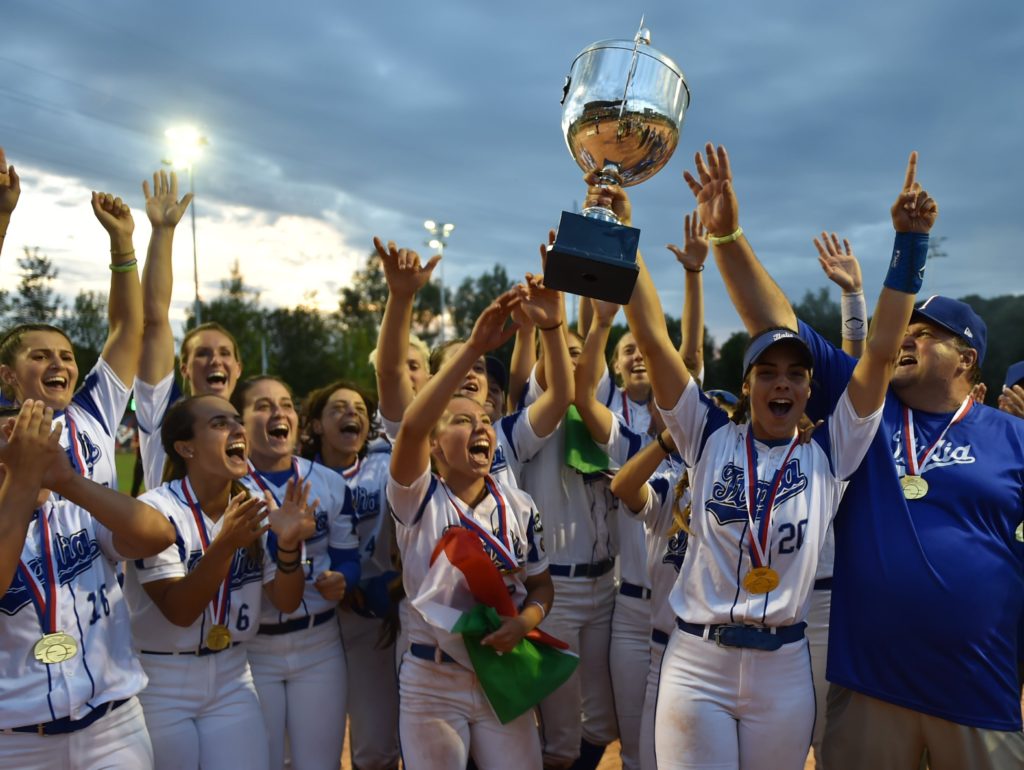
The Italian national team head coach, Enrico Obletter, died in February 2021 from complications resulting from Covid-19, but the club rallied to win the European Cup and then participate in the Olympics. Reaching the Olympics was a dream come true for Piancastelli, especially since her mother preceded her as a catcher and third baseman in the 2000 Games.
“I always wanted to be like my mom,” she said. “She wants me to be like her, but even better. That drives me to keep getting better every day.”
The 2021 Italian club faced stiff competition in Tokyo, going 0-5 against the United States, Australia, Japan, Mexico, and Canada. Piancastelli had two hits in 15 at-bats.
“Our pitching and defense kept us in the games, but we didn’t hit well,” Piancastelli said. Cecchetti agreed, saying, “We weren’t used to facing pitching that was that good.”
“Still,” Piancastelli said, “The summer was huge for Team Italy. We won the European championship and then the Olympic qualifying. Getting to the Olympics was a great accomplishment. We played a lot better than I expected, and it was an amazing experience that can only help going forward.”
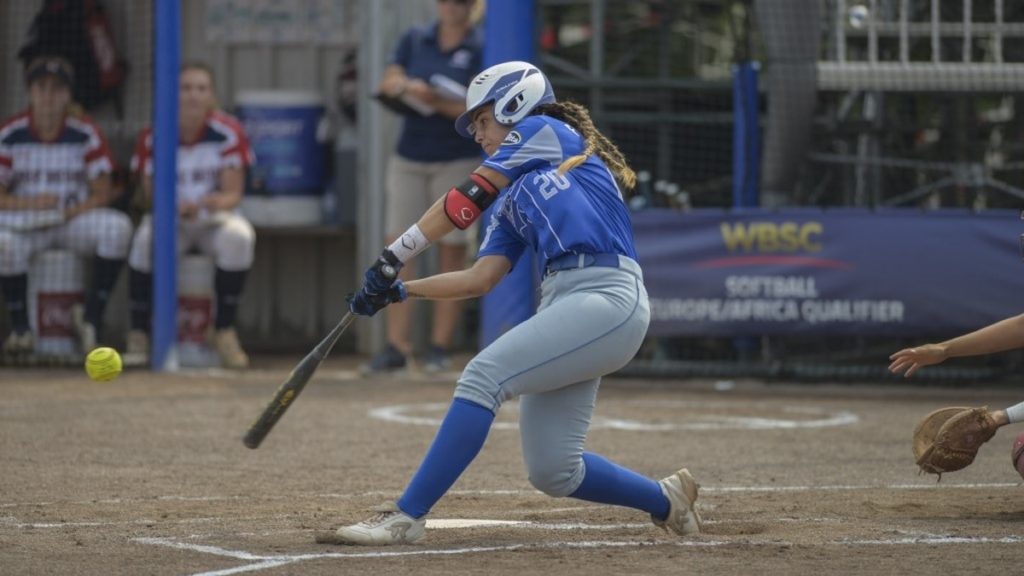
Piancastelli is currently looking forward to returning to Kyoto for another season in Japan. “It will be great to experience that again and see where it takes me,” she said.
Which leads to the broader question of what her future holds. Francesca is certain that Piancastelli still has more great achievements ahead.
“She and [Britt] Vonk [a middle infielder for the Dutch national team] are the only players in Europe that have a chance to play in the pro leagues,” he said. “They have more experience playing against top competition and get more at-bats against class pitchers, so you can really see the difference when they play. Vonk has been the best European player for ten years or so, but Erika is the best at the moment.”
Piancastelli indicated that she’ll be alternating between Europe, the U.S., and Japan for the foreseeable future.
“In a way, Italy will always be home because most of my family lives there,” said Piancastelli, who holds dual U.S. and Italian citizenship. “When I was young, I always wanted to move back there. But I’m kind of confused now as to what is home. My sister still lives in Carlsbad, so I imagine I’ll be bouncing back and forth a lot.
“A lot of what has happened wasn’t anything I really planned. Then I look back and see the whole journey, and it’s better than anything I’d ever imagined.”


